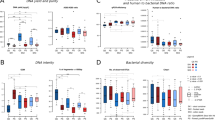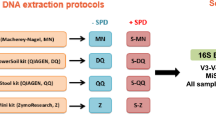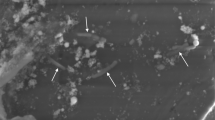Abstract
The human gastrointestinal (GI) tract contains a complex microbial community that consists of numerous uncultured microbes. Therefore, nucleic-acid-based approaches have been introduced to study microbial diversity and activity, and these depend on the proper isolation of DNA, rRNA and mRNA. Here, we present an RNA isolation protocol that is suitable for a wide variety of GI tract samples. The procedure for isolating DNA from GI tract samples is described in another Nature Protocols article. One of the benefits of our RNA isolation protocol is that sampling can be performed outside the laboratory, which offers possibilities for implementation in large intervention studies. The RNA isolation is based on mechanical disruption, followed by isolation of nucleic acids using phenol:chloroform:isoamylalcohol extraction and removal of DNA. In our laboratory, this protocol has resulted in the isolation of rRNA and mRNA of sufficient quality and quantity for microbial diversity and activity studies. Depending on the number of samples, the sample type and the quenching procedure chosen, the whole procedure can be performed within 2.5–4 h.
This is a preview of subscription content, access via your institution
Access options
Subscribe to this journal
Receive 12 print issues and online access
$259.00 per year
only $21.58 per issue
Buy this article
- Purchase on Springer Link
- Instant access to full article PDF
Prices may be subject to local taxes which are calculated during checkout

Similar content being viewed by others
References
Zoetendal, E.G. et al. Isolation of DNA from bacterial samples of the human gastrointestinal tract. Nat. Protocols 1, 870–873 (2006).
Zoetendal, E.G., Vaughan, E.E. & de Vos, W.M. A microbial world within us. Mol. Microbiol. 59, 1639–1650 (2006).
Cole, J.R. et al. The ribosomal database project (RDP-II): sequences and tools for high-throughput rRNA analysis. Nucleic Acids Res. 33, D294–D296 (2005).
Pieterse, B., Jellema, R.H. & van der Werf, M.J. Quenching of microbial samples for increased reliability of microarray data. J. Microbiol. Meth. 64, 207–216 (2006).
Fitzsimons, N.A., Akkermans, A.D. de Vos, W.M. & Vaughan, E.E. Bacterial gene expression detected in human feces by reverse transcription-PCR. J. Microbiol. Meth. 55, 133–140 (2003).
De Vries, M.C. Analyzing global gene expression of Lactobacillus plantarum in the human gastro-intestinal tract. Ph.D. thesis, Wageningen University, ISBN: 90-8504-344-1 (2006).
Schaffner, W. in Molecular Cloning: A Laboratory Manual. edn. 2 Vol. 3 (eds. Sambrook, J., Fritsch, E.F. & Maniatis, T.) B.18 (Cold Spring Harbor Laboratory Press, Cold Spring Harbor, New York, USA, 1989).
Author information
Authors and Affiliations
Corresponding author
Ethics declarations
Competing interests
The authors declare no competing financial interests.
Rights and permissions
About this article
Cite this article
Zoetendal, E., Booijink, C., Klaassens, E. et al. Isolation of RNA from bacterial samples of the human gastrointestinal tract. Nat Protoc 1, 954–959 (2006). https://doi.org/10.1038/nprot.2006.143
Published:
Issue Date:
DOI: https://doi.org/10.1038/nprot.2006.143
This article is cited by
-
Catestatin selects for colonization of antimicrobial-resistant gut bacterial communities
The ISME Journal (2022)
-
Deciphering the trophic interaction between Akkermansia muciniphila and the butyrogenic gut commensal Anaerostipes caccae using a metatranscriptomic approach
Antonie van Leeuwenhoek (2018)
-
Metformin alters the gut microbiome of individuals with treatment-naive type 2 diabetes, contributing to the therapeutic effects of the drug
Nature Medicine (2017)
-
Glycans affect DNA extraction and induce substantial differences in gut metagenomic studies
Scientific Reports (2016)
-
Stool metatranscriptomics: A technical guideline for mRNA stabilisation and isolation
BMC Genomics (2015)
Comments
By submitting a comment you agree to abide by our Terms and Community Guidelines. If you find something abusive or that does not comply with our terms or guidelines please flag it as inappropriate.



